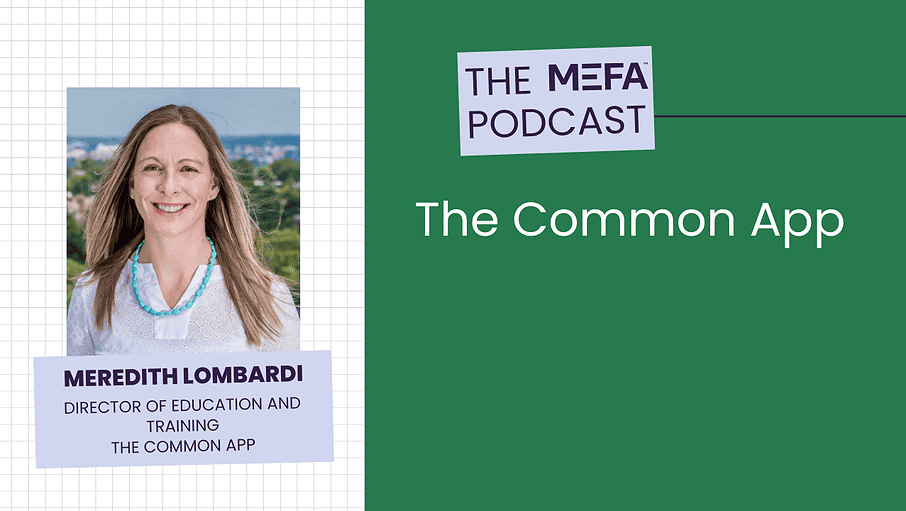

Resources Mentioned in this Episode
Jonathan Hughes: [00:00:00] Hello everyone and welcome to the MEFA Podcast. My name is Jonathan Hughes.
Julie Shields-Rutyna: And I’m Julie Shields-Rutyna.
Jonathan Hughes: And we have a great show for you today, and I think it’s going to be a really popular one because we’re talking about two things today that people always want to know about scholarships and the Common App.That’s right. So here to talk about applying to college and all the ways you can interact with the Common App is Meredith Lombardi, Director of Education and Training at the Common App. So we had a great conversation a while back. You’ll want to check it out. It’s specifically for high school juniors and sophomores looking ahead to the college admissions, process. And they’ll be doing that in the next year or two. But, you know, you’ll learn about all the different ways that they can interact with the Common App, which is the most popular application, [00:01:00] to, colleges in the country. So most colleges want their applications or will accept their applications through the Common App, so it’s going to be something that you’re really familiar with eventually. But Julie, shall we begin with scholarships?
Julie Shields-Rutyna: Yes, we shall. We know that people are always wanting to hear about scholarships and I will mention if you follow us on social, you’ll see that we post scholarship opportunities on a regular basis, and if you check out our blog every month, we post information about scholarships and about upcoming deadlines.
So joining us on the podcast today to talk about some very specific scholarship opportunities available for college students. Also high school seniors and younger students, is MFA’s own Lauren Danz. So Lauren, welcome back to the show.
Lauren Danz: Hi. It’s nice to be back. Thanks for having me.
Julie Shields-Rutyna: And I should [00:02:00] mention that Lauren is the one who posts a lot of those scholarships. That’s, that, that’s the connection there. So it’s really nice to have you back. So what would you like to share with us?
Lauren Danz: Yes. So today I have four separate scholarships that I’m going to highlight, and each one of them has different requirements. So before I begin, let me just mention that all of these are highlighted in our scholarships for high school Juniors blog post, and that’s the title of the blog. But most of these scholarships are open to additional grades as well, not just high school juniors.
Jonathan Hughes: All right, so what is the first one and what do we say about it?
Lauren Danz: Yeah, so the first scholarship is the Gloria Barron Prize for Young Hero Scholarship, and it’s open to children ages eight to 18 who are currently working on an inspiring service project or have done so in the past year. And that’s the first thing that I want to highlight so you can apply for this scholarship as [00:03:00] young as the age of eight. And that’s pretty young, and I think a lot of kids and parents are unaware and really surprised the kids as young as aide can apply for a college scholarship. So one of the things that we tell people with young children to do is to save, which they definitely should do, but they can also look around for some scholarships to help with their college savings as well.
So to apply, you submit the online application, including a letter from a nominator. There are multiple winners, and it’s a pretty big award. It’s $10,000 for the winner, the deadline to apply is April 15th and the link for the scholarship and all the other ones can be found in the blog post, which we’ll include in the show notes.
Jonathan Hughes: Oh, all right. So this is something that we were talking about. Just see other day, and Julie, I know there’ll be questions about this, but how on earth does someone who is 10 years out, from starting college get a scholarship? So is it, is the money held by the organization or is it paid out to the college? When the student goes to [00:04:00] college, does it get paid to the student or to, to the parent when they win? How do they handle that?
Julie Shields-Rutyna: Yeah, that’s a great question, Jonathan. And it, it really depends on the scholarship and the organization granting it. And it can be different from organization to organization. So some are held until the student goes to college and some are simple. Paid out right at the time that the student wins. So in this case, I don’t know. That’s something that the students should, and the family should look into when you’re applying to scholarships and just find out what, what the practice is. And again, it could be, you know, it could be paid out now or they could hold it the whole time. And then when it comes time to going to college, you should report, that any scholarship that you received outside to the financial aid office when, when you’re applying to college,
Jonathan Hughes: Even ones as far back as this,
Julie Shields-Rutyna: Yes, technically. So what else do you have for us, Lauren? [00:05:00]
Lauren Danz: Yeah, so next is the Unigo Young Hero Scholarship and this is open to legal US residents, ages 14 and older, and this one requires an essay on a really fun topic, and that’s which superhero or villain would you change places with for a day and why?
The amount is $2,500, which we should be clear, is a much more common amount. Most of the scholarships that we see are for less than $10,000, certainly. And this is more representative of the majority of scholarship awards. And the deadline for this one is coming up its March 31st.
Jonathan Hughes: Yeah, and I, I think that’s important to note. A lot of parents think of scholarship and they think of a full ride. Scholarship or, or you know, 20, 30, $40,000 in scholarships. And it is important to know that that’s not usually the case.
Lauren Danz: Yes, exactly. Yep. And so the next scholarship I want to talk about is really interesting. It’s the E-Waste Scholarship.
Students have to [00:06:00] complete an application and write a short essay about e-waste. The top 10 applications are selected as finalists and finalists have to write an additional 500 to 1000-word essay about e-waste, and the winner receives a $1,000 scholarship. The deadline for this one is April 30th, and something that sets this one apart from the others is that it’s also open to college students, including graduate.
Jonathan Hughes: Okay, Lauren, I, I have a confession to make. I don’t know what e-waste is. Can you tell me?
Lauren Danz: Yes. Yeah. So E-Waste is really, any sort of electronic device that’s now considered outdated and isn’t really used anymore. So like maybe a DVD player, tape recorder, anything like that.
Julie Shields-Rutyna: Yeah. So, so Lauren, what, what’s the last one you have?
Lauren Danz: Yeah. So the last one we have is the Ocean Awareness Contest, and applicants will need to research and choose an inspirational scientist, activist, artist, educator, or other hero who is working to solve climate change issues and create a [00:07:00] submission that highlights their efforts, organizations, and positive impacts.
And maybe you’ve noticed that all the other scholarships included an essay as the main submission. But for this one, you can also submit art, film, a video, creative writing, multimedia performing art, poetry or spoken word and this one is open for students ages 11 to 18, and there are multiple awards of up to $1,500. The deadline for this one is June 13th.
Julie Shields-Rutyna: Thank you so much, Lauren. So we will post the link to this article that lists all these scholarships in the show notes, and you should come back again.
Lauren Danz: I would love to come back.
Jonathan Hughes: Thank you. All right, well, thanks Lauren. Thanks, Julie. Now it is time for the MEFA Mail Bag, and these are questions that have come into us over the past weeks and answered by our College Planning Team.
Remember, if you have any questions, you can email us at [email protected]. You can call us at 800-449-MEFA. You can also reach us over [00:08:00] social media on Facebook. That’s @MEFAMA, on Twitter @MEFATweets and Instagram @MEFA_MA. Now a question today comes to us from Diane and she writes, can a UFund 529 College Savings Plan or a UPlan Prepaid College Tuition Plan be opened by a grandparent living in Massachusetts for a grandchild living in Vermont to be used for qualified educational expenses and what do we think, Julie?
Julie Shields-Rutyna: So, yes, so I’m going to take them separately. So let’s first talk about the UFund 529 Plan. So yes, a grandparent in Massachusetts can open an account for grandchild in Vermont, and yes, that student will then be able to go to college in Vermont and use. That the, you fund money, so that, that works fine from, from state to state and there isn’t a [00:09:00] boundary there, so that’s terrific.
Let’s talk about the you plan. So the you plan, and you can learn so much more about that on our website, but that is the prepaid tuition plan where you, you buy a percentage of, of tuition and fees at participating institutions, and that plan does have a set number of participating institutions, all of which are in Massachusetts.
So to realize the maximum benefit of the plan, you do that by choosing one of the participating institutions, both public and private in, in Massachusetts. However, I personally saved in a u plan for my kids and one went to college in New Hampshire and one went in Pennsylvania. So I was not able to get the maximum benefit, from that. But I was able, I saved money and I received the money back with, CPI [00:10:00] interest and I was able to use the money to pay college bills. So it worked out well for me too. It’s just that, that the, the huge benefit is, is when, a student attends one of the participating institutions.
Jonathan Hughes: All right, Julie, thank you. One more time. If you have questions, you can email us at [email protected]. You can call us at 1-800-449-MEFA. Once again, our Facebook is @MEFAMA. Our Twitter is @MEFATweets, and our Instagram is MEFA_Ma. Remember, we have a bench of college guidance experts waiting to answer your question.
Now, let’s go to my talk about the common app with the common app zone, Meredith lom. Since 2016, Meredith Lombardi has been the Director of Training and Education at the Common App before joining the Common App, she spent the previous 10 years as a high school counselor and academic advisor in the Metro DC area.
So she has a lot of experience of advising high school students and helping them get into college even [00:11:00] before joining the Common App. And the Common App is what she’s here to talk to us about today and the actual process, the nuts and bolts of actually how students apply to colleges. And what practical steps they have to take is something that a lot of students have questions about and I do too. So, thank you very much for, for coming onto the show, Meredith, and welcome to MEFA podcast.
Meredith Lombardi: Thank you. It’s great to be here.
Jonathan Hughes: So let me start off really basic. What is the Common App and who is the Common App?
Meredith Lombardi: Yeah. Common App has been around actually since 1975. We are a nonprofit membership organization, so students and families, they probably don’t think of us that way. But it started as a, a group of colleges again, in 1975. There were 15 that came together, and they created this thing called the Common App Experiment, where they. Believed that students were applying to peer institutions and was there a way to simplify that process for [00:12:00] students so that they could copy their information over from one institution to the next and not have to do that same information over and over. That launched the common app that now has grown in terms of a membership organization of. Colleges and universities to over 1000 institutions. So we have a, we offer an online application platform that students can use whether applying, to college right out of high school, or if they’re at one college and they want to transfer to another college.
So we have both a first year application platform and we have a transfer application platform. We are nonprofit and we are mission driven. So we have a mission, of promoting access, equity and integrity in the college admission process. So a lot of the work we do is not just to help students apply to college, but also being intentional about supporting the students who need it the most with the, the application process.
Jonathan Hughes: And so how do, what are some of the ways that you do that? [00:13:00]
Meredith Lombardi: Well, there’s, there, that’s a very loaded question, Jonathan.
Jonathan Hughes: Okay. Sorry.
Meredith Lombardi: No, because there’s, you know, the existing application itself and just how do we provide resources for students and for the counseling advising community. So I’ll, I’ll start there.
So we offer, Training and resources, through our, Outreach and education efforts. So anyone who’s looking for, let’s say, a Common App 101 training, right? They can, they can reach out to us for students, we have our, our website that has a lot of great information, commonapp.org. We also, have great video tutorials on YouTube.
We’re out on social media. We’re on TikTok providing resources for students. We have a blog that, Counselors can sign up for. So there’s again, the supports for the existing application and then there’s beyond, which is how do we reimagine the entire admission [00:14:00] process? How do we simplify the process?
How do we, listen to students and listen to the counselors and advising community to hear where barriers are and then actually make changes within the process. So things that we’ve been doing the last few years have been under a project we call evolving the application, which is actually to identify questions that provide.
That are barriers for students to actually submit an application and then to make adjustments. So we’ve made changes to things like removing school discipline questions, changing questions about military discharge or criminal history, edits to the, the fee waiver request process, to simplify that in the application. So just again, looking at. How can we simplify to make it easier for students?
Jonathan Hughes: And you said over a thousand institutions?
Meredith Lombardi: Correct.
Jonathan Hughes: So, and I believe I’m correct in saying the common app is the most [00:15:00] widely used, sort of college application. Is that correct?
Meredith Lombardi: Yeah, we have over a million students, that use the application each year to submit an application. We, last year had just over, I guess, 6 million applications submitted on the platform. So if you do the math, that’s right, around six applications, per student. But yes, it is, it is the largest, aggregate system of colleges and universities with one application platform.
Jonathan Hughes: Wow. That is, those are staggering numbers.
Meredith Lombardi: Yeah.
Jonathan Hughes: Thinking about all these students, you know, how do students most frequently interact with the Common App? When are they first sort of introduced to it and, and how?
Meredith Lombardi: I mean, your pathway into Common App can differ. Sometimes, you know, within schools, schools are introducing it to their students. Students can get in as, as early as, you know, being, 13 or older. So, it, you actually don’t have to wait until the year [00:16:00] that you’re applying to college, and the, the savvy students are the ones who kind of explore the process earlier because then it demystifies the process, right? So they can see what kind of questions are on an application.
You know, I recently, this is, this is a sidebar conversation, but, for a long time I had wanted to do global entry as an application right for travel and I was terrified that it was, it was so like, just the thought of it was so daunting that I never opened the application. And then when I actually did, I realized, oh, like these are questions I know the answers to.
I can actually do this. And there was like this true sense of relief when I hit submit on the application. And I think that it, college applications similarly when you have never done the process. It feels very daunting and there is a fear. So if we can get exposure to students of like, actually this is just about you.
Like you truly are just talking about yourself. They know [00:17:00] the answers to the questions. They just have to see them. So students can start as early as ninth grade. They can actually start answering questions. The application platform has a feature called account rollover. So students can be tracking their activities, they can be just looking at essay questions, researching colleges they can do that at any time and then again, we roll their information over. I would say about 25% of student. In common app who submit, actually created their accounts prior to their Senior year or to whatever year they’re applying to college.
Jonathan Hughes: One of the things that we talked about when we talked about you being on the show was that, we are really addressing Juniors, in the college admissions process.
That that’s when we see the college admissions process really begin. Is that Junior years. So I know that most students apply in the fall of their Senior years, but the process begins a bit earlier than that. So what are some ways that [00:18:00] Juniors, what can they start doing now in their college admissions process?
Meredith Lombardi: Creating a common app account is a great way to start. Again, with that account rollover. They can start that process now so that they’re not waiting until senior year. Common App actually launches on August 1st each year. It’s kind of when the rollover happens. So they can’t actually, juniors, they can’t apply right in junior year, but they can start exploring, they can start answering some questions.
This is the time for students to be doing that exploration. They’re not going to want to apply to 20 or 30 colleges. So getting their list down, the common app.org website allows students to actually do, virtual campus visits for schools. It’s a great way, again, knowing that students can’t go and visit every campus that they might want to visit, doing virtual tours is a way to do that exploration. Visiting college websites, [00:19:00] we try to, give students those resources upfront so that they can do the exploration to then help them with that match and fit and finding those, those right mix of schools to apply to. So I would say for Juniors it’s doing the exploration, becoming familiar with the application process, even looking at some things like what the requirements are.
So if you know that a school is going to require a Common App essay, you can actually start working on your essay. You don’t have to wait until senior year. If you know the school is going to require letters of recommendation. You can look at what are the, you know, who are the teachers that I might wanna ask for those letters of recommendation. If the school is going to require, standardized test scores, you can then be preparing for an SAT® or ACT. As it relates to testing, I will say that the majority of Common App schools are test optional, [00:20:00] over 90%. So there was already a movement towards an increasing number, right, of colleges going test optional. And then with the pandemic, right through necessity, they had to go test optional. But we’ve seen that trend continue, where students do not have to submit. So just understanding that landscape. Do I need test scores? Don’t I need test scores? Do I need letters of recommendation, do I not? And doing some of that preparation in advance, because we know Senior year it can be stressful and students already have like a lot just being students, so how can they prepare in advance?
Jonathan Hughes: Hmm. And now I’m curious too about the virtual visits. Is that something that really kickstarted during the pandemic and has it continued to be popular?
Meredith Lombardi: Yeah, we actually, we have an integration with a site UVisit, and that has been there since prior to Covid 19. And a lot of it is again about accessibility for [00:21:00] students. It’s just not realistic that students can go and travel everywhere that they would want to go. And you know, we have over a million students using Common App, 10% of those students don’t live in the United States. So you also factor in just where students are coming from and then where the common app members are.
In addition to like having international students, we have. We have over 60 colleges and universities that are outside of the United States. So for a student who might want to go and study full-time in another country, this just gives them that overview of being able to visit that school virtually without that in-person stay.
Jonathan Hughes: I was curious about the international college piece. I was going to ask you about it later, so I’m glad you brought it up. Speaking of colleges and different, you know, Practices. Some colleges do have specific applications or supplemental applications. How does that work with, with the Common App?
Meredith Lombardi: Yeah. So again, membership [00:22:00] organization within the application there is a common tab, or it’s called the Common App Tab, that is information that is about the student that is not specific to a particular college. Then students are adding the schools that they want to apply to within the platform. So let’s say they add five colleges.
Then they can answer individual college specific questions. That’s where the college is. If they have any supplemental questions or they want to learn something specific about a student, they’ll ask those in the supplemental questions. So students are answering common questions and then they’re answering college specific questions. But the goal again, is to simplify. So you’re, you’re logging in. One username and password into one portal, to be able to then send this information to multiple institutions.
Jonathan Hughes: Well, we talked about the ongoing process and the, the [00:23:00] constant sort of reevaluation of the common app and trying to break down barriers and offer more. What are some new updates or, or features that are coming this year or, or new in, in recent?
Meredith Lombardi: Yeah one thing that we really have been focusing on is access is affordability. So how can we help students navigate that? And that there’s been an evolution to that. Several years ago we had, integrated with Scholar Snap, which was a Michael and Susan Dell Foundation initiative to basically share data from within common. To Scholar Snap, which was an aggregate of scholarships and so students could actually send some of their common app answers to pre-populate some scholarships. Scholars Snap is now part of college board scholarship search and so that same integration exists within the Common app where students can send some of their common app [00:24:00] information over to College Board® as it relates to scholarships.
Integration actually lives on the financial aid resources tab in the application, so there’s actually a financial aid resources placed for students within the application. We know that students are thinking about the costs of attending college at the time that they’re applying to college. So anything we can do to help them understand the interplay between the two.
So that financial aid resources tab, in addition to the scholarship integration, there’s also information about the FAFSA. There’s information about, the CSS Profile®. There’s information. Or links to, you know, your state may also have its own financial aid, resources and applications. So we, we help students, we link them out to that, we provide them links to the financial aid website for whatever college they have on their [00:25:00] list so they can explore additional institutional scholarships. So we’re just, we want to be able to, to meet students where they are understanding that they are thinking about the affordability piece. I, I mentioned earlier about, our evolving the application work. So making updates in the fee waiver process, that was based on data that we saw where students who qualify to get application fee waivers were not necessarily asking for them, so paying unnecessary application fees.
So we made updates to just simplify the language so that students could see upfront, here are all the ways you might qualify. Do you think you qualify? Then they say yes, and that waives their application fees. We also have over 50% of Common App member schools that do not charge an application fee. So I would say one of the big things is, is this, college affordability piece.
The
Jonathan Hughes: last time we spoke, you were talking to us [00:26:00] about transfer students, filing the Common app. And I know we’re, we’re talking primarily about juniors here, but I didn’t know if you could talk about how transfer students might be able to use Common App as well.
Meredith Lombardi: Yeah it’s such an important conversation and what we have been, you know, focusing on at Common App is that. We have to actually talk about transfer earlier than the point of transfer because students go on many different pathways. So it, and you know this, like, they’re not necessarily going to go right from, I’m a Junior in high school, then I’m a Senior in high school, then I go right to a four year college. Right, you know, that year after. So letting normalizing for students. That students take many different pathways to higher education. They may start in the military and then come and want to get a four year degree. They may start at community college. They may start at one four year school and then transfer to another four year school.
We want to make sure that we are there meeting students wherever they are. [00:27:00] So yes, there is a separate transfer application platform that students can use. So they may end up using the first year application when they’re in high school, and then later using the transfer application if they, again, started a community college or they start at one four year school and want to transfer to another, or again, they do military. There’s many different paths where they might get, to that transfer application. But yes, there is a separate platform still. Our member institutions, still has that, the affordability piece where we are, you know, either schools are not charging an application fee or there is the fee waiver that students can use to use that platform.
Jonathan Hughes: And if anybody has questions, whether they’re juniors or transfer students or what have you, and they’re interested in, in applying to colleges or want to take a look at the Common App, how do they find.
Meredith Lombardi: So commonapp.org right? Is like the portal place to go for all things Common [00:28:00] App related. The other place I would say is to follow us on social media. So we’re @CommonApp on most platforms. I also want to put a plug out for Reach Hire, which is the, the part of Common App that is the initiative started by former First Lady Michelle Obama to really encourage students to pursue their education after, high school. And that can be at a two-year school, a four year school, some kind of, you know, workforce development, military, anything where they’re just continuing that education and our reach, higher social media, does a lot to bring student stories to other students, so they’re really great at. Communicating with students, sharing resources the TikTok is through, Reach Higher and Better Make Room, which is the student facing part of social media.
But I think if students follow. On any social media platform, Common App, Reach Higher, [00:29:00] Better Make Room, they’ll, they’ll always be up to date with what’s going on at our organization. They’ll know how to reach out if they ever have questions, and they’ll get all the resources that they need.
Jonathan Hughes: Well, it’s hard to imagine, applying to college without the common app. So, we’re very happy to have you on and I learned a lot today. I always like it when I learned, from a guest and I learned quite a bit today. So thank you so much, Meredith, for being on.
Meredith Lombardi: Oh, it was great to be here. Thank you.
Jonathan Hughes: All right folks. Well, that about wraps it up for us. I want to thank Lauren Danz and Meredith Lombardi for being here.
And folks, if you liked what you heard today and you want to know more about planning, saving, and paying for college and career readiness, you can follow the show on Apple Podcasts, Spotify, Stitcher, wherever you get your podcasts. And please remember to review us. It helps us to keep doing what we are doing, and to get this show out in front of folks like you. So, Lauren, thank you once again. Julie. Thank you.
Julie Shields-Rutyna: Thank you.
Jonathan Hughes: And I want to thank Shaun Connolly, [00:30:00] our producer and AJ Yee for his assistance in posting the show. Once again, my name is Jonathan Hughes, and this has been, The MEFA Podcast.










